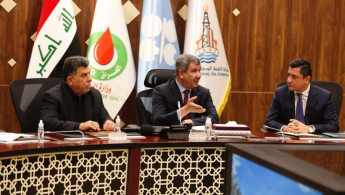Iraq's SOMO informs international companies not to buy oil from KRG
A senior official in the Iraqi oil ministry on Monday reemphasised that the ministry has informed the international companies to cease purchasing crude oil from the semi-autonomous Kurdish region of northern Iraq, as the US ambassador to the country discusses the issue with the head of Iraq's judiciary.
Alaa al-Yasiri, the director of Iraq's State Organization for Marketing of Oil (SOMO) told the state-run Iraqi News Agency (INA) that SOMO has taken "marketing measures" against the export of oil from the Iraqi Kurdistan region (IKR) and that "all the international companies have been informed not to buy crude oil from the Kurdistan region."
The Iraqi Federal Supreme Court ruled in mid-February against the Kurdistan region's oil and gas law, passed in 2007 by the region's parliament and regulates the oil and gas sector in the region. Iraqi Kurdistan started exporting its oil independently without the consent of the federal government in Baghdad in 2014.
Al-Yasiri also stressed that the Kurdistan Regional Government is obliged to carry out the decision by Iraq's Federal Supreme Court, the highest court in the country, that has ruled out "all contracts signed between the KRG and the international oil companies for extraction and importing oil from the region as void."
The Iraqi official also clarified that the legal step by the Iraqi government came after the KRG refused to cooperate with Baghdad to implement the decision.
He also pointed out a news report by Reuters that the KRG's oil exports had declined to about 355000 barrels of oil per day with a deducted price of about US$16 to US$20 per barrel as compared to the official price by Iraq's oil ministry.
Baghdad's oil ministry in July said that US oil giants Baker Hughes, Halliburton and Schlumberger are committed not to initiating new projects in Kurdistan, and are also working to "liquidate and close" existing contracts.
Meanwhile, INA reported that the ambassador of the United States to Iraq, Alina L. Romanowski, on Monday met with judge Fayaq Zidan, head of Iraq's Supreme Judicial Council, and both sides "discussed follow-ups on complaints against oil companies at the commercial court."
"The February decision by the Iraq supreme court invalidating Kurdish Regional Government arrangements for export of oil and gas was – and the enforcement of that was an issue on which the US, on the one hand, takes no legal position, no constitutional position, but on the other hand, pushing forward right now in the midst of an ongoing crisis over – political crisis over government formation simply would risk a widening kind of economic crisis, and that is the last thing that the Iraqi public needs," Assistant Secretary of State for Near Eastern Affairs Barbara A. Leaf told reporters last week.
She also suggested that Baghdad and Erbil discuss arrangements to take this into a third-party negotiation.
Early in July, a commercial court in the Iraqi capital annulled contracts between the Kurds and foreign firms after the oil ministry in Baghdad filed a judicial complaint.
Authorities in the Kurdistan capital cried foul, accusing Baghdad of heaping "unjust pressure" on them and announcing their legal action.
Iraq, the second-largest producer in the Organization of the Petroleum Exporting Countries, sits on enormous oil reserves, and revenues from the sector feed 90 per cent of the federal government budget.





 Follow the Middle East's top stories in English at The New Arab on Google News
Follow the Middle East's top stories in English at The New Arab on Google News


![22 Arab countries at COP29 have rejected the targeting of fossil fuels [Getty]](/sites/default/files/styles/image_330x185/public/2024-11/GettyImages-2184289638.jpg?h=199d8c1f&itok=ptHl5bec)